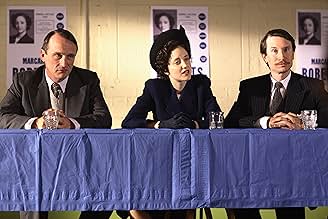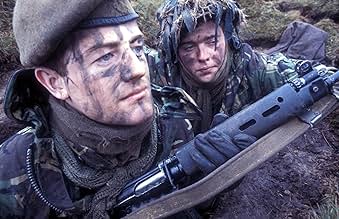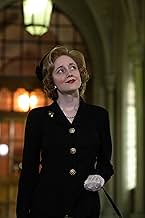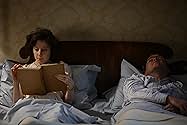On April 2, 1982, Britain went to war to regain the Falkland Islands. This movie is a gripping account of how Prime Minister Rt Hon Margaret Thatcher MP's government handled the biggest cris... Read allOn April 2, 1982, Britain went to war to regain the Falkland Islands. This movie is a gripping account of how Prime Minister Rt Hon Margaret Thatcher MP's government handled the biggest crisis in British foreign affairs since the Suez Canal. It tells the story of how Argentina, a... Read allOn April 2, 1982, Britain went to war to regain the Falkland Islands. This movie is a gripping account of how Prime Minister Rt Hon Margaret Thatcher MP's government handled the biggest crisis in British foreign affairs since the Suez Canal. It tells the story of how Argentina, an ally of the British, fought the Conservative government and invaded the Falklands. This ... Read all
- Director
- Writer
- All cast & crew
- Production, box office & more at IMDbPro
Featured reviews
As noted by a reviewer above, Thatcher's political position was very weak at the time. She was seen by the country and many of her "wet" cabinet ministers as being a right wing liability who would sink the Tories at the next election because she had worsened, not improved, Britain's economy. Unemployment had sky-rocketed.
The decision to withdraw HMS Endeavour from the South Atlantic (the supply ship for the Falklands) was made by her right wing Defence Minister John Nott on grounds of cost- cutting. Both the Foreign Office under Carrington and I believe the Chiefs of Staff and the Intelligence Services opposed it on the grounds that the Argentinians would interpret the withdrawal as a sign that the UK was not serious about maintaining its Falklands colony and this would greatly encourage them to invade. Thatcher overruled them and backed Nott. She therefore had direct responsibility for this mistaken decision and should, on the Argentinian invasion, have resigned.
This was known at the time of the Saturday House of Commons debate by many people, especially on the Conservative back benches. There was great unease on them, and talk of replacing her. What saved her probably was Michael Foot's highly patriotic support of her in his speech and the fact that the debate only lasted 4 hours rather than the more usual 8. (Clever work probably by the Whips). If it had been 8, it is very likely that this unease about Thatcher would have surfaced from both wets and right wingers who suspected she was an incompetent woman who had blundered into a war.
Then, had she been replaced - probably by a wet ("wets" by and large were of an older generation than the supporters of Thatcher and had fought in the 2nd War and would have been thought "reliable" to fight another war) - the war would have gone ahead, Britain would again probably have won, and a "wet" rather than Thatcher would have been in charge of Britain and subsequent history would have been radically different. But it is through ironies like this that history operates. As it was, it was those who had been originally been right on "Endeavour" who were forced to resign like Carrington, and Thatcher, the British politician (along with Nott) most responsible for allowing the war to break out, the person who went on to be lionised as a great Churchillian war leader.
The Saturday Commons debate was the great turning point. Curteis presents the debate falsely as a straight patriotic piece of Churchillian stiff upper-lip tub thumping. (This is understandable, the Left had been and was caricaturing Thatcher mercilessly in their propaganda and Curteis's play is his right-wing propaganda blast back). But it would have been far more interesting - and dramatic - to go for neither villains or heroes, but what history really consists of - human beings. And by showing complexities and ironies, rather than pieties and propaganda.
I'm sorry to disappoint any die hard anti-Thatcher or socialist critics reading this, but this play depicts what happened in those meetings. Mrs Thatcher didn't rub her hands with glee at the prospect of war after all, neither did the Conservative government ritually dine on a feast of babies before holding meetings and not all political drama has to have a strong left wing edge. And if you still think this play is a whitewash, then can I direct you to the primary source material this play was written from. Patricia Hodge is great in the role of Mrs Thatcher, and her put down of Tony Benn (again, it's a real quote, that dialogue did happen) at the end is brilliantly realised.
Patricia Hodge was wonderful as "Maggie" and being a big fan of British TV and films many other faces were quite familiar. I was quite struck by how Rt Hon Francis Pym and members of the labor party has so quickly forgotten the lessons and cost of appeasement! At one point I would've loved to hear Mrs. Thatcher respond to those questioning the rightness of fighting over "some small rocks and a handful of people" with "If 1,800 British subjects are not worth fighting for, please tell me, exactly, what is the minimum number that IS? 5,000? 10,000? 100,000? 1,000,000?"
Besides having been there to listen to the daily coverage, I've watch a number of documentaries and read a number of books on the battle including the memoirs of the Battle Group Commander Adm. Sandy Woodward. Everything in this movie tracks closely with everything else that I know about the time, the situation and the battles. The one thing I would take exception with, frankly comes as no surprise to me. The all too familiar anti-American jealousy/prejudice that is very common in British programming. One need only contrast the carefully chosen flattering selection of Patricia Hodge to play Margaret Thatcher with the perhaps equally carefully chosen unflattering selection of Bob Sherman to play President Reagan. Not only did he bear no resemblance beyond an American accent, he played Reagan as a bumbling fool who couldn't even remember the name of the islands rather than the strong leader who helped bring down the Berlin wall and with it the Soviet Union. The most pathetic moment was portraying Reagan as having trouble deciding which tie to wear while discussing the issues. That was simply petty and mean.
Lost in all of this is the reality that the British government had allowed this crisis to develop through apathy, neglect and an unwillingness to sacrifice. The Argentine government was emboldened to act due to the steady decline of the power of the Royal Navy and in fact, had they the patience to simply wait a year or two more, the RN's only two carriers would've been decommissioned and Britain would've been forced to accept the take over of the islands. As it is, the losses of British shipping, especially that of the Sheffield and Coventry were reportedly contributed to a decision to cut costs on construction by reducing the length of the ships eliminating the space required for the anti-missile system they were originally designed to carry. This would seem to be a major deficiency for a ship supposedly designed for radar picket duty to detect and defend incoming missile attack! Oddly enough, another documentary I recently watched about the Eurofighter project disclosed similarly dangerous cost cutting which only proves that even those lessons written in blood are too soon forgotten!
The film certainly has a fine cast. Patricia Hodge excels as Thatcher or at the very least playing the Thatcher portrayed in the script. Hodge's Thatcher is a strong willed woman who refuses to back down under any circumstances. The supporting cast includes strong performances from James Fox as Foreign Secretary Lord Peter Carrington, Clive Merrison as Defence Minister John Nott, Colin Stinton as US Secretary of State Alexander Haig, John Woodvine as Admiral Sir Terence Lewin and Tom Chadbon as Admiral Sir John Fieldhouse. Each of their performances, and those of much of the rest of the cast, gives the film a strength that it needs.
The production values of The Falklands Play are strong as well. Melanie Allen's production design captures the real life settings of the film including an excellently done set of the House of Commons. The film's cinematography is exceptional as well with its cinema verite approach. The result is that the film is given a strong documentary feel to the entire film, giving the viewer the sense of watching history unfolding before them. The film also makes strong use of documentary footage from the time as well, mixing it skillfully into the drama. Like the performances, these elements give the film a strength that it needs.
The script by Ian Curteis is at the heart of the film. The script after all was the single most controversial aspect of the production for almost twenty years. Back in the 1980s, the BBC deemed the script to be too pro-Thatcher and jingoistic in its tone. Looking at the film itself, it is very easy to see how that came about. The strong willed portrayal of Thatcher and her handling of her the situation is certainly pro-Thatcher. Also the film's portrayal of the decisions leading to the sinking of the Argentinian warship the General Belgrano, one of the most controversial events of the war, can certainly be seen to be pro-Thatcher. Surprisingly, the script used in the film isn't even the one originally written in the 1980s as it removes all the scenes involving the Argentinian Junta and the Pope. One suspects that the reaction the film would have gotten in the 1980s when it was supposed to have aired would have been similar to the reception that the 2003 Showtime film DC 9/11: Time Of Crisis (a film about President George W. Bush's handling of the 9/11 attacks and the lead up to the invasion of Afghanistan) received when it aired: being seen overwhelmingly as a piece of propaganda. The Falklands Play definitely isn't that but it is all too easy to see how it could have been seen as such.
The Falklands Play is an interesting film. It has strong performances from its entire cast and also features strong productions values especially with its cinematography. The script however is the film's most interesting point as it was the source of controversy that kept the film from originally being made to begin with. With hindsight, it is easy to see why the script proved so controversial at the time and why it could remain so today. The Falklands Play therefore is an interesting film about a controversial war and a intriguing piece of historical drama.
Did you know
- TriviaOriginally commissioned by the BBC in 1987, but wasn't filmed until 2002.
- GoofsAdmiral Lewin is wearing the South Atlantic Medal. Before the war had even begun.
- Quotes
[in a War Cabinet meeting]
Margaret Thatcher: Do we send those ships? Do we still have the will to fight aggression by force of arms, even halfway across the world, even at huge risk of world opinion turning against us? Because if we don't have it any more, for God's sake say so now and pull out before we start. It may be we *are* going to war. People *will* get killed. Innocent people. Young soldiers, many of whom won't even know what it is we are fighting for. Are we really prepared to do that? Do we still believe what we certainly believed in in 1940? Or is that now just the romance of history, nothing to do with the cold reality of Britain in 1982, part of a nation that has, actually, quietly died, as Greece died, as Spain died? Because if in our hearts we really believe that Britain is dead, then it would be a crime of the direst and blackest sort to send those men to fight, a crime of which the country would very soon find us guilty, because their hearts won't be in it. The first death will light the fuse that will blow us sky-high and clean out of office at the next election. Now, do we send the signal or not?
[each cabinet minister, with some hesitation, says "yes"]
- Crazy creditsThe first names of Nicholas Ridley and Jeanne Kirkpatrick were mis-spelled as Nicolas and Jeane in the closing credits.
- ConnectionsFeatured in When TV Goes to War (2011)



































